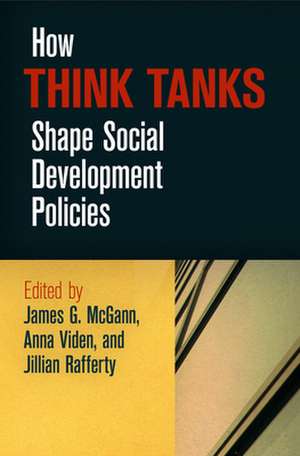How Think Tanks Shape Social Development Policies
Autor James G. Mcgann, Anna Viden, Jillian Raffertyen Limba Engleză Hardback – 6 iul 2014
Each chapter provides an overview of the approaches and organizational structures of specific think tanks, as well as the political, economic, and social opportunities and the challenges of the environments in which they operate. The contributors study the stages of innovative think-tank-aided strategies implemented in highly industrialized world powers like the United States and Russia, emerging countries such as China, India, Brazil, and South Korea, and developing nations that include Ethiopia, Kenya, and Tanzania. Accompanied by an extensive introduction to contextualize the history and theory of policy institutes, this comprehensive comparison of policy success stories will be instructive and transferable to other think tanks around the globe.
Contributors: Assefa Admassie, Celso Castro, Kristina Costa, Francisco Cravioto, Marek Dabrowski, Matt Dann, He Fan, Rajeev Gowda, Oh-Seok Hyun, Christian Koch, Jitinder Kohli, R. Andreas Kraemer, Elena Lazarou, William Lyakurwa, Ashwin Mahesh, Florencia Mezzadra, Partha Mukhopadhyay, Mcebisi Ndletyana, Sridhar Pabbisetty, Miguel Pulido, Marco Aurelio Ruediger, Maria Belen Sanchez, Dmitri Trenin, Samuel Wangwe, Vanesa Weyrauch, Maria Monica Wihardja, Rebecca Winthrop, Wang Xiaoyi."
Preț: 564.84 lei
Preț vechi: 611.77 lei
-8% Nou
108.09€ • 112.12$ • 90.13£
Carte indisponibilă temporar
Specificații
ISBN-10: 0812246012
Pagini: 384
Dimensiuni: 190 x 239 x 34 mm
Greutate: 0.75 kg
Editura: MT – University of Pennsylvania Press
Notă biografică
Cuprins
Preface
Introduction: Social Development, Think Tanks, and Policy Advice
PART I. EDUCATION
Chapter 1. Brookings: The Case for Global Education
—Rebecca Winthrop
Chapter 2. CIPPEC: The Monitoring Project for the Law on Educational Funding
—Florencia Mazzadra, Vanesa Weyrauch, and María Belén Sánchez
PART II. INFRASTRUCTURE
Chapter 3. Centre for Public Policy (CPP): Indian Institute of Management Bangalore
—Rajeev Gowda, Ashwin Mahesh, and Sridhar Pabbisetty
Chapter 4. Centre for Policy Research (CPR): Reforming the Urban Transit System in Delhi
—Partha Mukhopadhyay
PART III. ENVIRONMENT AND SUSTAINABLE DEVELOPMENT
Chapter 5. The Ecologic Institute: Ecologic Institute Influence on Policies in Germany and the EU
—R. Andreas Kramer
Chapter 6. MISTRA: Configuring Research Teams to Realize Policy Influence
—Mcebisi Ndletyana
Chapter 7. Gulf Research Center (GRC): Promoting Social Development in the Arab Gulf Region
—Christian Koch
PART IV. ECONOMIC REFORM, DEBT CRISIS MANAGEMENT, AND ECONOMIC COORDINATION
Chapter 8. Bruegel: Creating Your Own Luck
—Matt Dann
Chapter 9. Center for Strategic and International Studies (CSIS): Shaping Development Policy in a Globalized World
—Maria Monica Wihardja
Chapter 10. Chinese Academy of Social Sciences (CASS): Reshaping China's Development Strategy
—He Fan
Chapter 11. Center for Social and Economic Research (CASE): Think Tanks in the Era of Globalization
—Marek Dabrowski
Chapter 12. Korea Development Institute (KDI): Korean Service Sector Advancement
—Oh-Seok Hyun
PART V. AGRICULTURE AND LAND DEVELOPMENT
Chapter 13. Fundar: Subsidios al Campo: Farm Subsidy Policy in Mexico
—Miguel Pulido and Francisco Cravioto
Chapter 14. Ethiopian Economics Association: Stories of Social and Economic Policy Influence
—Assefa Admassie
Chapter 15. CRESS: The Grassroots Perspective and Policymaking—
—Wang Xiaoyi
PART VI. POVERTY ALLEVIATION
Chapter 16. African Economic Research Consortium (AERC): Shaping the Policymaking Process and Its Outcomes
—William Lyakurwa
Chapter 17. Research on Poverty Alleviation (REPOA): Think Tanks and Social Development Policy in Tanzania
—Samuel Wangwe
PART VII. SOCIAL POLICY
Chapter 18. Center for American Progress: Importing Social Impact Bonds—
—Jitinder Kohli and Kristina Costa
Chapter 19. Carnegie Moscow Center: Russia's Social Development: A Continuing Story—
—Dmitri Trenin
Chapter 20. Fundação Getúlio Vargas: PRONASCI: A Study of Brazilian Think Tanks
—Celso Castro, Elena Lazarou, and Marco Aurelio Ruediger
Conclusion
Index
Acknowledgments
